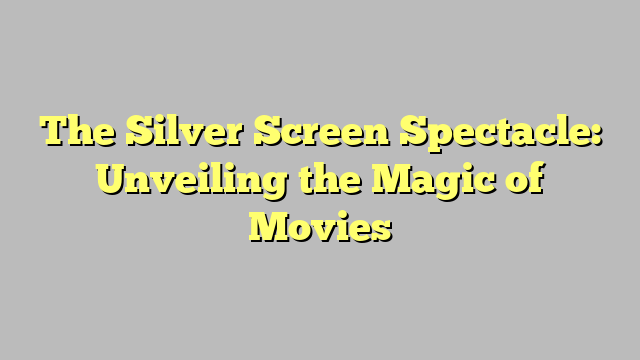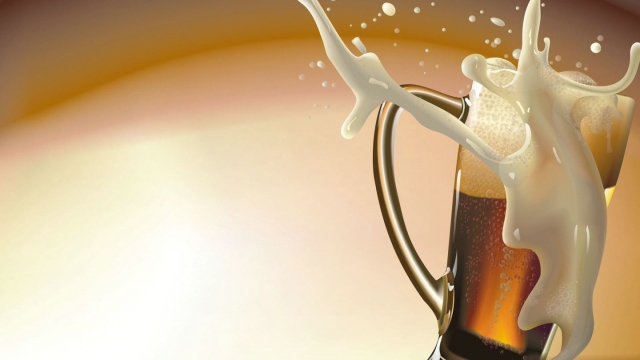Movies have always captured our imaginations and transported us to different worlds. From the enchanting romance of classic films to heart-pumping action sequences that leave us on the edge of our seats, the silver screen has the power to bring stories to life like no other medium. With their vibrant visuals, compelling characters, and gripping narratives, movies have the ability to elicit a wide range of emotions and create unforgettable experiences for viewers of all ages.
One of the most remarkable aspects of movies is their ability to transcend time and space. Whether we find ourselves in a bustling metropolis, a far-off galaxy, or a fantastical realm, movies allow us to explore different cultures, eras, and possibilities. Through the creative vision of filmmakers, we are able to witness incredible stories unfold before our eyes, igniting our curiosity and expanding our understanding of the world around us. The silver screen truly has a magical quality, drawing us in and captivating us with its larger-than-life representations of reality.
Evolution of Movies
The history of movies is a captivating journey that showcases the incredible evolution of visual storytelling. From the early beginnings of silent films to the high-tech mastery of modern cinema, movies have continually pushed the boundaries of creativity and entertainment.
In the late 19th century, the advent of motion pictures revolutionized the world of entertainment. Pioneers like the Lumière brothers and Thomas Edison paved the way for the emergence of the film industry. These early films, usually short and devoid of sound, mesmerized audiences with their ability to capture real-life moments on screen.
With the passing decades, movies evolved exponentially in both technical and narrative aspects. The introduction of synchronized sound in the late 1920s brought a newfound realism to the art form, enabling filmmakers to incorporate dialogue and music into their stories. This breakthrough contributed to the emergence of iconic films such as "Gone with the Wind" and "The Wizard of Oz," forever changing the landscape of cinema.
The progression continued with advancements in special effects, allowing filmmakers to create grand spectacles that transported audiences to fantastical realms. The release of films like "Star Wars" and "Jurassic Park" showcased the power of visual effects, immersing viewers in breathtaking worlds and creatures that were previously unimaginable.
Movies today have reached unprecedented heights of realism and immersion. Technologies like computer-generated imagery (CGI) and motion capture have revolutionized the way films are made, enabling filmmakers to bring to life extraordinary visions with unparalleled precision. From superhero blockbusters to awe-inspiring animated adventures, the modern film industry continues to captivate audiences with its boundless imagination and technical prowess.
In conclusion, the evolution of movies has been a remarkable journey, from the humble beginnings of silent films to the awe-inspiring visual grandeur of today’s cinema. As technology advances and artistic innovation continues to push boundaries, we can only anticipate that the magic of movies will continue to take us on awe-inspiring adventures for years to come.
Impact on Culture
Movies have had a profound impact on culture over the years. They have been a powerful medium for storytelling, entertainment, and artistic expression. Through the silver screen, movies have influenced society, shaping popular trends, attitudes, and values.
Firstly, movies have the ability to reflect and comment on the cultural norms and social issues of their time. Film has been a platform to explore and challenge societal values, giving voice to marginalized groups and shedding light on important cultural conversations. Whether it’s addressing topics like racism, gender inequality, or political unrest, movies have the power to provoke thought and inspire change.
ดูหนัง
Furthermore, movies have the ability to unite people from all walks of life. They have become shared experiences that transcend borders, languages, and generations. Whether it’s a blockbuster superhero film or an independent foreign production, movies have the capacity to bring people together, fostering a sense of community and collective enjoyment.
Lastly, movies have shaped popular culture, influencing fashion, music, and even language. Iconic movie characters and their memorable quotes have become part of our everyday lexicon. Fashion trends showcased on the big screen have often become fashion statements in the real world. The influence of movies on culture is evident in the way we consume entertainment and engage with the world around us.
In conclusion, the impact of movies on culture cannot be underestimated. They have the power to challenge, unite, and shape societies. As the silver screen continues to captivate audiences worldwide, movies will undoubtedly continue to play a significant role in shaping our cultural landscape.
Future of Film
The future of movies is an exciting realm of possibility. As technology continues to advance at an astonishing pace, we can expect to see significant changes in the way films are made and experienced.
Firstly, advancements in virtual reality (VR) and augmented reality (AR) will revolutionize the movie-watching experience. Imagine being fully immersed in a film, where you can interact with the characters and explore the movie’s world in ways we can only dream of today. VR and AR technologies have the potential to transport audiences to new dimensions and redefine the boundaries of storytelling.
Additionally, the rise of artificial intelligence (AI) will have a profound impact on the film industry. AI algorithms can analyze vast amounts of data to identify patterns and predict audience preferences. This capability will help filmmakers make smarter decisions in creating and marketing their movies. From personalized recommendations to AI-generated scripts, the merging of creativity with intelligent systems will shape the future of storytelling.
Furthermore, the advancements in digital effects and CGI will continue to push the boundaries of visual spectacle in film. We have already witnessed breathtaking visual effects in movies, but with the constant progress in technology, we can expect even more visually stunning and realistic experiences on the silver screen.
In conclusion, the future of film holds tremendous potential in terms of immersive technologies, AI-driven innovation, and mind-blowing visual effects. As we continue to push the limits of technology, movies will evolve into more interactive, personalized, and visually captivating experiences. The magic of movies will only continue to grow and captivate audiences in ways we can only begin to imagine.


